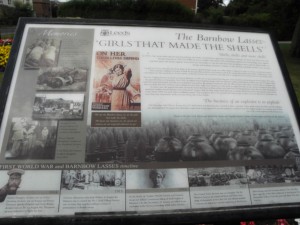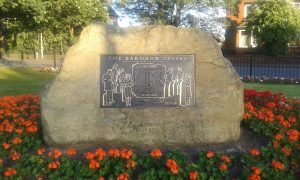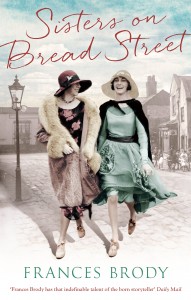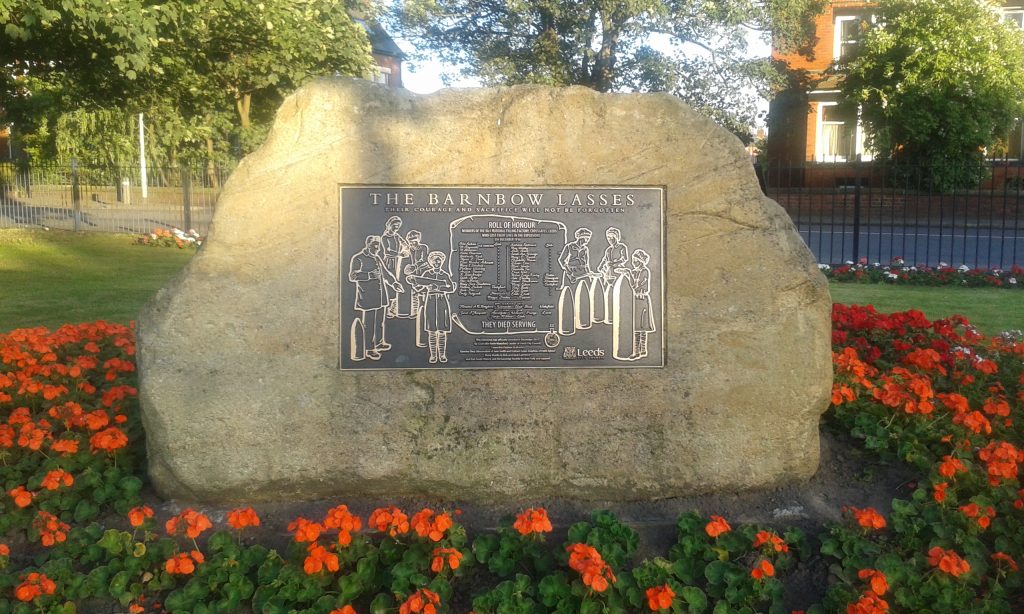In the week that Alice Nutter’s play, the Barnbow Canaries is on at the West Yorkshire Playhouse, Frances Brody shares a little of the history of the Barnbow workers and the sacrifices they made.

On a bitterly cold morning a few years ago, a small crowd gathered in Manston Park, Cross Gates to witness the unveiling of the new memorial commemorating the thirty-seven ‘Barnbow Lasses’ and three men killed in explosions at the Barnbow Munitions Factory in December 1916, March 1917 and May 1918.
The Barnbow workers were casualties of the Great War as surely as if they had been in the trenches. News of the factory explosions was kept secret at the time for security reasons. Only notices of accidental deaths in the evening papers provided a hint of the tragedy that occurred on 5 December, 1916, when thirty-five women and girls lost their lives.
The First National Shell Filling Factory eventually covered around 400 acres, incorporating two farms. The farms were necessary to supplement rations. Working with chemicals caused illness and yellowing of the skin. Drinking milk was thought to help and workers were encouraged to drink lots of it – provided by the Barnbow cows. Employees were recruited from Leeds, Castleford, Wakefield and surrounding areas. As more men went to fight, women eventually comprised over ninety percent of the workforce, operating eight hour shifts around the clock.
Later the land became the site of Vickers Tank Factory. Now, houses have been built there and many streets named for those who lost their lives.
 In Manston Park, on that chilly day, local residents, relatives of those who lost their lives, clergy, councillors, members of the East Leeds History and Archaeology Society and children from nearby primary schools came together to ensure that those who died would not be forgotten. The ground surrounding the memorial was bare that morning. Children were invited to design a flower bed.
In Manston Park, on that chilly day, local residents, relatives of those who lost their lives, clergy, councillors, members of the East Leeds History and Archaeology Society and children from nearby primary schools came together to ensure that those who died would not be forgotten. The ground surrounding the memorial was bare that morning. Children were invited to design a flower bed.
The 40 and the 64 buses stop outside the park. The memorial is near the gate. Further up Manston Lane on the right is the housing development where streets are named for some of the women. The Leeds Way starts a little farther on.
 Somewhere Behind the Morning (2005), the Leeds-based saga that includes characters involved with Barnbow, and an account of the explosion, originally published by Frances under the name Frances McNeil, was re-published in January 2016 as a Frances Brody novel, going back to its original title Sisters on Bread Street, and re-launched at this year’s Big Bookend Festival, along with Sixpence in Her Shoe and Halfpenny Dreams.
Somewhere Behind the Morning (2005), the Leeds-based saga that includes characters involved with Barnbow, and an account of the explosion, originally published by Frances under the name Frances McNeil, was re-published in January 2016 as a Frances Brody novel, going back to its original title Sisters on Bread Street, and re-launched at this year’s Big Bookend Festival, along with Sixpence in Her Shoe and Halfpenny Dreams.
Bread Street was the street off York Road where Frances’ mother lived until the age of eleven. It’s where Ebor Gardens Primary School now stands. Frances says that she couldn’t have guessed that a few years after writing the book that she would be living so close to where the Barnbow tragedies occurred.
Alice Nutter’s Barnbow Canaries is on at the West Yorkshire Playhouse until Saturday 9th July. Limited seats only left. An excellent play marking 100 years since the catastrophic explosion that killed so many Leeds women.

